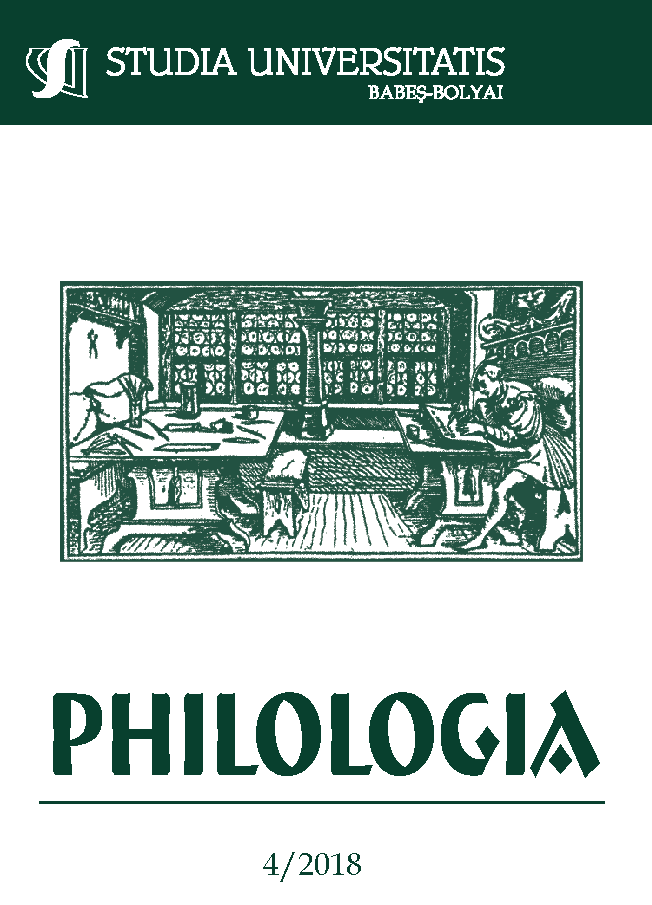REVIEWING FAMILY HISTORY: RECENT IRISH FICTION AND THE AVATARS OF MEMORY
DOI:
https://doi.org/10.24193/subbphilo.2018.4.04Keywords:
fictional biography, imagined past, multi-layered form.Abstract
Reviewing Family History: Recent Irish Fiction and the Avatars of Memory. This article endeavours to demonstrate that in the fiction produced by writers of Irish origin towards the end of the 20th century a discernible feature is the renewed interest in history, this time not in the great historical upheavals that have always fascinated novelists and playwrights, but rather in the “little histories”of individuals and families. Sewn together, these patches of family history can be seen as being an unofficial (fictional?) biography of the nation.
Rezumat. Revizuind istoria de familie: ficțiunea irlandeză recentă și avatarurile memoriei. Articolul de față încearcă să demonstreze faptul că una dintre trăsăturile detectabile în romanul irlanez al sfârșitului de veac XX este interesul reînnoit pentru istorie, de această dată nu atât în marile schimbări istorice care au fascinat întotdeauna romancieriii și dramaturgii, cât mai degrabă față de „micile istorii” despre indivizi și despre familii. Împletite împreună, aceste frânturi de istorii de familie, pot fi citite drept o biografie neoficială (ficțională?) a unei națiuni.
Cuvinte cheie: biografie ficțională, trecutul imaginat, formă multi-stratificată
References
Banville, John. 1991. The Book of Evidence. London: Minerva.
Banville, John. 2005. The Sea, London: Picador.
Banville, John. 2009. “On Being Banville – and Black,” The Saturday Interview – John Banville. In The Irish Times (August 29).
Banville, John. 1979. “Novelists on the Novel”. Interview with Ronan Sheen and Francis Steward. In Declan Kiberd 1995.
Deane, Seamus. 1996. Reading in the Dark. London: Jonathan Cape.
Imhof, Rüdiger. 2002. The Modern Irish Novel. Dublin: Wolfhound Press.
Kiberd, Declan. 1995. Inventing Ireland. The Literature of the Modern Nation. London: Vintage.
McMinn, Joseph. 2000. Contemporary Irish Fiction: Themes, Tropes, Theories. London: Macmillan.
Messud, Claire. 2009. “Of Gods and Men” (review of The Infinities). In The Irish Times (August 29).
Patten, Eve. 2006. “Contemporary Irish Fiction”. In The Cambridge Companion to the Irish Novel, ed. John Wilson Foster. Cambridge: Cambridge University Press, 259-76.
Patten, Eve. 2007. “’Life Purified and Reprojected’: Autobiography and the Modern Irish Novel”. In Modern Irish Autobiography. Self, Nationa dna Society. Edited by Liam Harte. London: Palgrave Macmillan, 51-70.
Trevor, William. 1989. The Silence in the Garden. Harmondsworth: Penguin.
Trevor, William. 2006. “The John Tusa Interview,” BBC (August 2). https://www.bbc.co.uk/programmes/p00ncz6v
Downloads
Published
How to Cite
Issue
Section
License
Copyright (c) 2018 Studia Universitatis Babeș-Bolyai Philologia

This work is licensed under a Creative Commons Attribution-NonCommercial-NoDerivatives 4.0 International License.





 ©Studia Universitatis Babeş-Bolyai Philologia. Published by Babeș-Bolyai University.
©Studia Universitatis Babeş-Bolyai Philologia. Published by Babeș-Bolyai University.